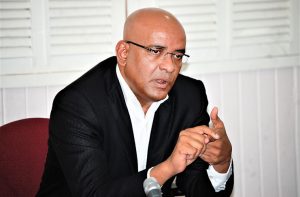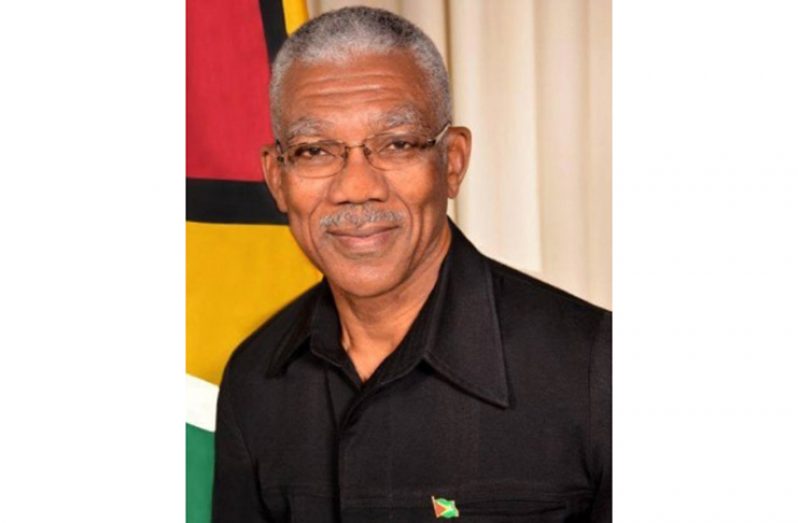— gov’t urges citizens, maintains there is no ‘constitutional crisis’
AFFIRMING that no “constitutional crisis” is looming, the government has called on citizens to desist from disorderly behavior and let good sense prevail despite the opposition leader’s attempt to escalate political tension.
Subsequent to receiving correspondence from Guyana Elections Commission (GECOM) Chair (ret’d) Justice James Patterson, regarding the commission’s preparedness to hold elections by November 2019, the same was formally relayed to Opposition Leader, Bharrat Jagdeo.
In a letter on behalf of President David Granger on March 20, 2019, Minister of State, Joseph Harmon, wrote: “In the circumstances, I am instructed to inform you that His Excellency, the President, intends to shortly name a date for General and Regional Elections in Guyana within the framework provided by the chairman of the Guyana Elections Commission.”
However, on Thursday, Jagdeo responded to Harmon by way of letter stating that beginning today, he would consider that the “Government becomes illegal”.
He referred to the GECOM chairman’s statement regarding the commission’s inability to hold credible elections before late November 2019 as “totally unacceptable”.
At his recent press conferences, the opposition leader has threatened on several occasions to escalate pressure against the government as he projects that a “constitutional crisis” is approaching.
To ensure that the day’s proceedings coincide with their mantra, the PPP has planned several protest activities today.
In a bid to rally supporters, the PPP took to its Facebook page yesterday calling on party loyalists to “set their profile photo and cover to all black” and to go live on social media during the protest activity.
Initially, Jagdeo had pushed for elections by March 21 but has now revised this to April 30, 2019 when the current voter’s list expires.
His push continues even as the commission has made known its inability to achieve such, and that the need for eligible youths to be included on a new list through house-to-house registration is fundamental.
Constitutionally, elections were due next year, but following the passage of a no- confidence motion against the government last year December, early elections are likely.
The government has since challenged the validity of the motion before the Court of Appeal with a determination on this matter and two others expected today.
Even as these matters play out, President David Granger had indicated his wiliness to name an election date based on the advice of the commission.
He also committed to providing the necessary funding through appropriation from the National Assembly, which the commission since stated that the complete exercise will cost G$3.5B.
NO CRISIS
Both President Granger and other members of Parliament have long debunked the message of the opposition that Guyana is near a “constitutional crisis”.
“There here is no crisis. There are issues which have to be resolved and most of those issues will depend on what I hear from GECOM when I consult them,” the President had said.
Attorney General Basil Williams rubbished the “constitutional crisis” arguments, stating that Article 106 (7) of the Constitution clearly states that the President and his government will remain in office until a new president is sworn in.
Others have noted that at no time can the country be without a President or government.
Meanwhile, Minister Harmon also spoke with the Guyanese diaspora in New York during a recent visit.
“Guyanese people are smart and they know the type of political leadership they have had. So try to get the facts and analyse it for yourself. Don’t believe the fake news. Guyana is not in a crisis. Guyana has a strong stable government, which respects the Constitution, respects the rule of law and will never damage that.”

During their visit to GECOM on Wednesday, even representatives of the Carter Center put forward suggestions for an election time period which saw August 2019 as a possible month for election.
This is far from the April 30 deadline being lobbied for by the opposition which would see elections taking place in 39 days or less.
The Constitution allows for there to be an extension of the three-month time period with a vote of two-thirds of the National Assembly but the opposition leader, thus far, remains obstinate against granting such.
Jagdeo continues along the path even as elections in Guyana have been delayed several times without a crisis and at least two times under the presidency of Jagdeo.
In 2001, General and Regional Elections were due on January 17 in accordance with the Herdmanston Accord; however, the then President (Bharrat Jagdeo) had cause to delay the elections based on the advice of GECOM.
Again in 2006 under Jagdeo’s presidency, elections were delayed whereby the constitutional deadline was August 4, 2006, but GECOM was unable to meet it.
In a statement on Tuesday, May 2, 2006, Jagdeo dissolved Parliament and elections were later held on August 28 that year.
Even as the opposition leader has planned protests and urged his supporters to “chase” government supporters when they visit their communities, the government has condemned these remarks as a threat to social cohesion.
It continues to encourage the general public to exercise good sense and to desist from disorderly behaviour as law enforcement agencies will treat condignly, any disorderly conduct.












